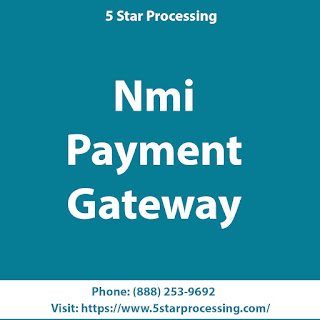All you need to know about NMI payment gateway
If you're a business owner and you
want to accept credit cards, then NMI is the payment gateway for you. NMI was
created in 1999 by Interchange Plus Corporation (IPC), which was acquired by
MPI in 2004. NMI offers its customers a wide range of services including
merchant account management, fraud management tools, and reporting tools that
make it easy to get started with accepting credit cards online.
NMI is a payment gateway for credit card
processing.
NMI is a payment gateway for credit
card processing. It allows you to accept credit and debit cards, as well as
prepaid cards like gift cards, through your website or mobile app.
NMI has been around since 2003, and it
has changed over time to ensure that it continues to meet the needs of
merchants who use its services. The company offers three different plans: Basic
($10/month), Standard ($25/month), and Enterprise ($50/month).
Your merchant account ID and merchant
transaction key act like a username and password to connect you to the
payment-processing network.
Your merchant account ID and merchant
transaction key act like a username and password to connect you to the
payment-processing network. You need these two items to access this network, so
you'll need to ensure that they're available before continuing with this step.
Your company's unique identifier
(a.k.a., "merchant account ID") is an alphanumeric string that
identifies your business on the NMI Payment Gateway system. This number can be
found under Settings > Account Information in your Merchant Account
Management Console or by logging into any of our products (eCommander Lite,
eCommander Ultimate and eCommerce Manager).
Like with any other payment gateway,
getting started with NMI comes down to shopping around and doing some research.
In order to get started with NMI,
you'll need to do some research. Look at the businesses you want to accept
payments from and consider their different options for accepting payments. Be
sure that you're getting good value for your money by comparing fees and other
key terms of service (TOS).
Look at what types of merchants are
available in the market, how much they charge per transaction, and how many
transactions they can process per day. For example, if a merchant has a low
price point but can only process one transaction daily—and it's not worth
paying more than $50 just for that feature—you might not want them on board
because there are plenty others who offer higher prices but more flexibility
around when they accept payments or how many transactions they allow each
month/yearly period; these will give you more control over costs so that you
can decide exactly how much money goes towards processing fees versus other
costs like marketing efforts
NMI offers a variety of pricing options —
interchange-plus pricing and tiered pricing are the two most popular options.
NMI offers a variety of pricing
options — interchange-plus pricing and tiered pricing are the two most popular
options.
Interchange-plus pricing is the most
common type of NMI payment gateway, and it's also what you'll find if you
search for "NMI" on Google or Bing. With this type of approach, you
pay a flat fee per transaction (like $0.05). This means that regardless of how
much money is sent through your business's account or whether it's processed
manually or automatically via ACH transfers or eWallets like Paypal Express
Checkout (PECO), there will always be an additional charge associated with
processing those transactions at checkout.
Tiered Payment Gateways
NMI also offers value-added services,
including gateways, shopping carts, reporting tools, fraud management tools and
an online payment form.
NMI also offers value-added services,
including gateways, shopping carts, reporting tools and fraud management tools.
These can be used to provide additional functionality to your website or mobile
app.
NMI is a payment gateway for credit
card processing.
For its customers, NMI offers a wide
variety of payment solutions.
The first thing you'll need to do is
get a merchant account ID and merchant transaction key. These are the same
things you use when setting up an online store, but they're much more
complicated than your typical username and password.
For example, let's say that you want
to accept American Express (Amex) payments on your website. In order to receive
Amex card transactions through NMI, you'll need a merchant account ID that
matches the information required by Amex when sending out receipts or
statements—and then there's also an optional PIN number so customers can verify
their identity before completing their purchase on your site if desired!
Once everything is set up properly at
both ends of this transaction chain (you know how those terms roll), then it
becomes easy enough for anyone who wants access just like anyone else does:
just head over here!
Conclusion
We hope you've found this article to
be helpful in your quest to learn more about NMI. We know that there are a lot
of companies out there offering similar services, but NMI has stood out from
the crowd by providing quality customer service and innovative products at
competitive prices.

Comments
Post a Comment